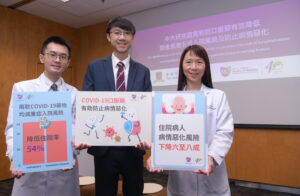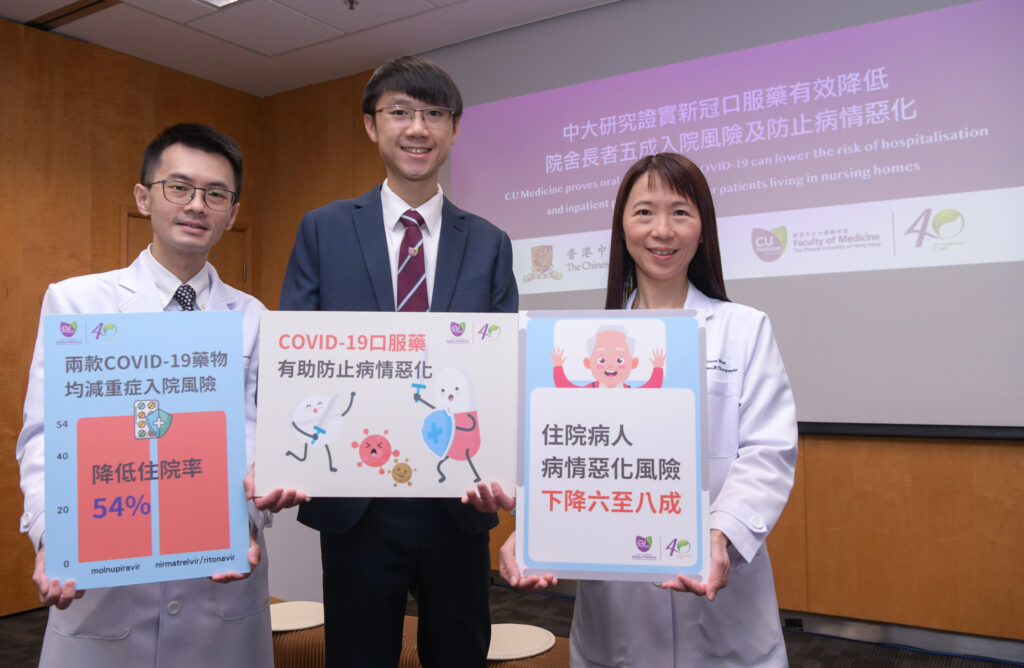CUHK
News Centre
CU Medicine proves oral antivirals for COVID-19 can lower the risk of hospitalisation and inpatient progression in older patients living in nursing homes
The Department of Health announced recently that the widespread use of oral antiviral drugs helped reduce the threat of SARS-CoV-2 infections. The Chinese University of Hong Kong’s (CUHK) Faculty of Medicine (CU Medicine) analysed data of 14,000 patients with COVID-19 living in nursing homes, proving two oral antivirals Molnupiravir and Nirmatrelvir/ Ritonavir, known as Paxlovid, are effective in lowering the risk of hospitalisation by 54% and the risk of inpatient disease progression by 65-83%. The research team believes the results provide strong evidence to encourage older patients, both in nursing homes and in the community, to seek medical assistance and take oral antivirals as soon as they get infected. Details of the study have been published in the international journal JAMA Network Open.
Data to evaluate efficacy of COVID-19 antivirals for older and frail patients is insufficient
Previous international studies have proved Molnupiravir and Nirmatrelvir/ Ritonavir are effective in lowering the risk of hospitalisation or death, but data was mainly based on the young to middle-aged group and lacked that from older and frail patients.
Professor Grace Wong Lai-hung, Professor of the Department of Medicine and Therapeutics and Director of Medical Data Analytics Centre (MDAC) at CU Medicine, said, “Old people living in nursing homes are usually older and frailer than their community-dwelling counterparts, and some may be suffering from co-morbidities and disability. Thus, they have a higher risk of death or poor progression if they are infected with SARS-CoV-2. COVID-19 outbreaks in residential care homes for the elderly (RCHEs) caused significant morbidity and mortality during the 5th epidemic in Hong Kong. We therefore carried out this study to see if the two oral antivirals are effective in reducing the risk of hospitalisation or inpatient disease progression among older patients.”
Both studied antivirals can lower the risk of hospitalisation and inpatient progression in older patients
CU Medicine collected and analysed data of 14,617 patients living in nursing homes who got infected with SARS-CoV-2 between February and March 2022. The average age of the study subjects was 83-85. One-third of them (35.5%) were prescribed with Molnupiravir, 3.3% used Nirmatrelvir/ Ritonavir, and the remaining 61.2% did not use oral antivirals. With a follow-up of 30 days on average, researchers found that the risk of hospitalisation dropped by 54% and the risk of inpatient disease progression was reduced by 65-83% after the patient had taken oral antivirals.
Dr Terry Yip Cheuk-fung, Assistant Professor of the Department of Medicine and Therapeutics and Assistant Director of MDAC at CU Medicine, said, “Study results showed both Molnupiravir and Nirmatrelvir/ Ritonavir can lower the risk of hospitalisation for older patients. And for inpatients, the antivirals are effective in reducing the risk of disease progression.”
Dr Bosco Ma Hon-ming, Associate Professor (Honorary) of the Division of Geriatrics, Department of Medicine and Therapeutics at CU Medicine, concluded, “Our study was conducted at the peak of the fifth wave of COVID-19 in Hong Kong. The results have substantial clinical significance in managing patients with COVID-19 in RCHEs. According to the statistics of Department of Health, reinfection rate in RCHEs is as high as 70%. We appeal to medical professionals to prescribe oral antivirals for patients in RCHEs in order to relieve their illness and alleviate the burden on the healthcare system. We are grateful to have the support of the Hospital Authority Head Office, seven clusters, and 15 community geriatric assessment teams in combatting COVID-19 in RCHEs and for this research.”

CU Medicine analysed data of 14,000 patients with COVID-19 living in nursing homes, proving two oral antivirals Molnupiravir and Nirmatrelvir/ Ritonavir, known as Paxlovid, are effective in lowering the risk of hospitalisation by 54% and the risk of inpatient disease progression by 65-83%. The research team believes the results provide strong evidence to encourage older patients, both in nursing homes and in the community, to seek medical assistance and take oral antivirals as soon as they get infected.
(From left) Dr Bosco Ma Hon-ming, Associate Professor (Honorary) ; Dr Terry Yip Cheuk-fung, Assistant Professor and Assistant Director of Medical Data Analytics Centre; and Professor Grace Wong Lai-hung, Professor and Director of Medical Data Analytics Centre, from the Department of Medicine and Therapeutics at CU Medicine.




